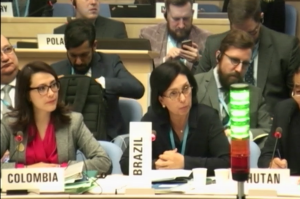After lengthy negotiations, on Friday, 26 January 2018 the World Health Organization’s Executive Board approved a decision to reinvigorate the Organization’s work program on innovation and access to medicines.
Here are two quotes from KEI on the decision:
James Love, Director, Knowledge Ecology International
“The decision has a broad mandate for the WHO to act, and the recommendations to the member states are very good. We are happy to see support to expand the medicines patent pool, and that WHO member states continue to support delinkage of R&D costs from the prices of drugs and other products. Most surprising to was the opposition from the United States to measures that would make R&D costs more transparent. When negotiating drug prices, or designing and evaluating incentives mechanisms and new business models, having good and granular data on actual R&D costs is important. Promoting ignorance to protect excessive prices and bad business models is inexcusable. Ironically, the most important proposals to make R&D costs transparent have come from the United States, with bipartisan support. It is somewhat of a mystery why the Trump Administration has zeroed in on transparency of R&D costs at this meeting, but it shows that the large drug companies see transparency of R&D costs as an existential threat to their ability to expand monopolies, protect excessive prices and protect existing business models.”
Thiru Balasubramaniam, Geneva Representative, Knowledge Ecology International
“We are heartened that the decision encourages countries to implement schemes which ‘partially or wholly delink product prices from R&D costs.'”
The report and the recommendations of the overall programme review of the global strategy and plan of action on public health, innovation and intellectual property were published in November 2017. For previous KEI analysis on the report, please see: https://www.keionline.org/23627/
Operative paragraph 1 of the decision refers to “the recommendations of the review panel that are addressed to Member States and consistent with the global strategy and plan of action on public health,innovation and intellectual property.”
Operative paragraph 2 urges member states to ” to further discuss the recommendations of the review panel not emanating from the global strategy and plan of action on public health, innovation and intellectual property”. Just before the adoption of the decision, Brazil requested the Secretariat to note for the record, the three recommendations (4, 27, and 28) which fell into this category.

Operative paragraph 3 of the decision applies to recommendations of the overall programme review specifically directed towards the WHO secretariat.
The text of the decision reads:
The Executive Board, having considered the report by the Director-General regarding the overall programme review of the global strategy and plan of action on public health, innovation and intellectual property,1 and its annex, decided to recommend to the Seventy-first World Health Assembly the adoption of the following decision:
The Seventy-first World Health Assembly, having considered the report by the Director-General regarding the overall programme review of the global strategy and plan of action on public health, innovation and intellectual property, and its annex, decided:
(1) to urge Member States to implement, as appropriate and taking into account national contexts, the recommendations of the review panel that are addressed to Member States and consistent with the global strategy and plan of action on public health, innovation and intellectual property;
(2) to urge Member States to further discuss the recommendations of the review panel not emanating from the global strategy and plan of action on public health, innovation and intellectual property;
(3) to request the Director-General to implement the recommendations addressed to the Secretariat as prioritized by the review panel, in an implementation plan, consistent with the global strategy and plan of action on public health, innovation and intellectual property;
(4) to further request the Director-General to submit a report on progress made in implementing this decision to the Seventy-third World Health Assembly in 2020, through the Executive Board at its 146th session.
(Tenth meeting, 26 January 2018)
1 Document EB142/14 Rev.1.